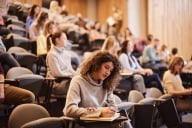You have /5 articles left.
Sign up for a free account or log in.
Academic extremism risks damaging the standing of Australia's universities, the country's education minister, Christopher Pyne, warned last week.
His comments come in the wake of the controversy over the support for the anti-Israel boycott, divestment and sanctions movement by the University of Sydney's Centre for Peace and Conflict Studies and The Australian's revelations this week that a Sydney senior lecturer was part of a WikiLeaks Party delegation granted an audience with the Syrian dictator Bashar al-Assad, where they affirmed "the solidarity of the Australian people."
"The commonwealth government's highest priority in higher education is quality," Pyne said in a carefully coded caution.
"Every vice chancellor should always be reviewing whether their university is meeting high standards of quality in order to protect its reputation but also Australia's international reputation in education."
Pyne hinted that Sydney's vice chancellor, Michael Spence, and bodies such as its senate, which had a string of left-leaning celebrity candidates including columnist Peter FitzSimons, ABC broadcaster Andrew West and former state minister Verity Firth recently elected to its ranks, should act.
"Each university is responsible for its own governance, but universities should avoid needless controversies that damage their reputation [and] also make Australia look less respectable to our potential international student market," he said.
Pyne used diplomatic but firm language to warn higher education institutions against ideological self-indulgence that could sabotage the sector.
"One of the most important things that the government can do is build revenue to universities by growing the international student market," he told The Weekend Australian.
"Universities should be partners in this goal and ensure that their reputations support rather than hinder that."
The acting vice chancellor at the University of Sydney, Tyrone Carlin, declined to say whether he was concerned that academic Tim Anderson's visit to Syria with the WikiLeaks group would damage the university's standing.
"The University of Sydney believes it is essential for academics to be able to able to express their views publicly on any matter within their area of expertise," Carlin said.
He said he was satisfied with the recruitment practices of the peace studies center and the department of political economy, where Anderson works, and the scholarly credentials and academic rigor of both bodies.
Anderson has backed calls by Jake Lynch, the CPACS chief, for Sydney to sever its ties with Israeli institutions.
Lynch's support for the boycott movement, which explicitly equates Israel with apartheid-era South Africa, has been condemned by Pyne and Foreign Minister Julie Bishop, who this week called the WikiLeaks delegation's endorsement of the Assad regime "extremely reckless."
Anderson accused critics of "a cold war mentality" over Syria.








